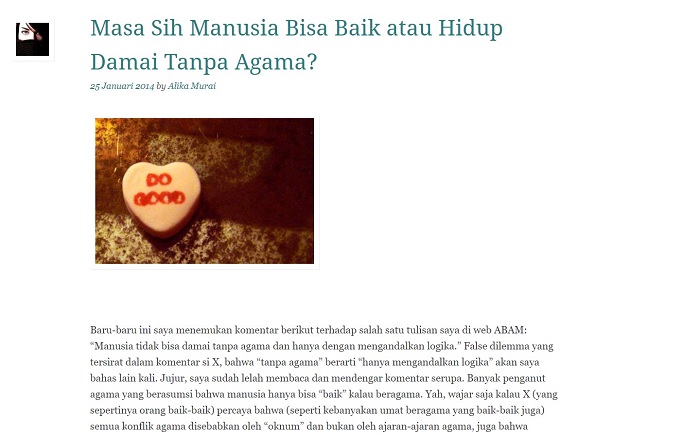Indonesian atheist ‘ask me anything’ group promotes civil online discussion of a hot topic
Valbiant
At university I noticed something weird about people´s perception of atheism. I was at an Islam-based university yet for some reason most people did not have a strong opinion about atheism. Perhaps this sounds normal because after all atheism is not that unusual in the world. But the same people held extremely hostile opinions about other religions such as Christianity, or even about different schools of thought within their own religion such as Ahmadiah or Shia.
I found this puzzling because they should have at least been able to find similarities with the Christian view since both believe in God’s existence. They even believe in exactly the same God as people who practice Shia. So why was there so much public hatred toward Christianity, Ahmadiah or Shia, but no sign of a witch-hunt or even aggression towards atheism?
I decided to dig deeper. I asked my peers specifically to explain the basis upon which they had formed their opinion about atheism. What I got was interesting. In general, their answers fell into one of three groups. The first was rather small. These people believed atheists were ‘too smart’ because they read too many philosophical books and worshipped logic. On the contrary the second, bigger, group thought atheists were stupid because ‘of course there is a god’. Atheists to them were people who had just not studied the Qur’an properly, nor read any books by the Turkish Islamic creationist Harun Yahya.
The consensus so far seemed to be that atheism was obviously wrong, ridiculous and therefore harmless and undeserving of aggression. Except for the last group.
Communism
The third group did not seem to adhere to any cohesive reasoning. They were a minority but they were also very loud. When asked about atheism, for some reason they kept talking about communism, and getting agitated on the subject too. It is no secret that Indonesians have a deep and ongoing hatred of communism. I recall a witch-hunt at my university once that resulted in physical violence simply because a student was caught wearing a Che Guevara t-shirt. This might sound absurd since there has been no communist party in Indonesia in our lifetime but, when it comes to fighting communism, many Indonesians treat it like a crusade. Many university students do not know the difference between communism as a political party/ideology and atheism as a metaphysical conviction. Once you know a bit of Indonesian political history, however, this surprising ignorance can be understood.
Back in the 1950s the biggest political party was an Islamic one called Masyumi. Second biggest was the PKI (Indonesian Communist Party). After the failed PKI coup in 1965, General Suharto committed to destroying both the party and its ideology. Simply saying communism was a bad idea would not have been enough. To destroy one of the largest communist parties in Southeast Asia required a massive propaganda effort. To inspire hatred towards communism in a country with the world´s largest Muslim population, the Suharto regime associated communism with atheism. The death of six generals during the failed coup – allegedly by torture – was explained by saying communists were atheists and lacked a moral compass.
A 1984 movie Pengkhianatan G30S/PKI (Treachery of the 30 September Movement/PKI), reinforced this myth. It became compulsory viewing for every Indonesian citizen once a year. All television stations broadcast the three hour 40 minute movie at the same time. Schools, government institutions and local government officials diligently told everyone to watch. They would always ensure Indonesians remained ‘alert to the danger of communism’. A movement of popular hatred was created that led to killing, kidnapping, and imprisonment on a massive scale. Everyone associated in any way with communism during the 1960s was affected. Survivors and their family members and descendants got a special mark on their national identity card. This prevented them from entering the civil service and restricted them in many other ways. This admittedly over-simplified history should provide some context for the hatred many Indonesians feel towards atheism and for its association with communism.
Such ignorance puts atheists in a position where they cannot have a civil discussion with members of the general public. They quickly get dragged into an exchange that tends to involve hate speech. A long history of hatred, ignorance and misinformation – the blasphemy law of the early 1960s still exists – makes the risk of a witch-hunt real. Nobody in their right mind wants to openly claim they are an atheist and that is the reason all discussion on this topic is held in online forums. Hiding one´s identity is easier there.
Online
Many online discussions of religion emerged in the 2010s. Among them were Dialog Ateis Indonesia (DAI), Ateis Indonesia (AI), and Komunitas Ateis Indonesia (KAI). Emphasising freedom of speech, they allowed discussion to flow with minimal rules. While obviously a good thing, we can imagine how quickly these discussions could turn ugly, especially when the nature of the subject was combined with anonymity. This type of forum remains hugely popular among people who love to express their opinion. New topics and replies can appear almost every second.

Your questions answered on 'Anda Bertanya Ateis Menjawab'
The establishment of an independent Facebook discussion group called Anda Bertanya, Ateis Menjawab (You Ask, Atheists Answer), known as ‘ABAM’, was inspired by a discussion thread in Kaskus, a popular online forum similar to Reddit. Kaskus had a discussion thread called ‘fight club’. This was a no rule, no boundaries, nothing is barred space where everyone was allowed to say anything about anything, including God and religion. Within that thread, there was a space called Anda Bertanya, Buddhist Menjawab (You Ask, Buddhists Answer). Anyone could ask anything they liked and someone would provide an honest, explanatory, gentle answer. At about the same time, there was an article in a widely read blogging site, Kompasiana, that sparked a debate on atheism. It was well-mannered and scientifically correct. This gentle approach to discussion of a taboo subject inspired me to start ABAM. It was a tightly moderated fan-page that intended to provide gentle, factual answers to common questions relating to atheism. Its desire to promote civility and a friendly atmosphere was reflected in its symbol of a green smiley mascot shaped as a question mark. The idea was to answer each serious question in as well-versed, well-researched, and well-mannered a way as possible.
Others later borrowed the name to set up other pages. One was the satirical site, Anda Bertanya, Habib Rizieq Menjawab (You Ask, Habib Rizieq Answers). This sardonic page used as its icon a fake image of one of Indonesia’s most famous clerics, the founder of the Islamic Defenders Front (FPI). Another was Anda Bertanya, Science Menjawab (You Ask, Science Answers).
Struggle
As a question and answer and discussion space, ABAM had its ebb and flow, depending on the time and energy the administrator and moderator could dedicate to answering questions. At the beginning, most of the administrative team could still afford to dedicate a lot of time, and discussions went relatively well. But at other times it could quickly turn hostile and offensive. ABAM was still a stand-alone fan-page. Then Karl Karnadi, the founder of AI, persuaded me to incorporate ABAM into the AI program. This has breathed new life into the page. Although rarely taking part in the discussion, Karl Karnadi serves as one of the administrators and has rescued ABAM just when it seemed in trouble.
From the word go, ABAM faced scepticism from within the atheist communities. People felt it would be impossible to reason with theists while maintaining a high degree of patience. ABAM administrators would be forced to deal with constant barrages of ignorance and emotive arguments. Yet others believed in the concept. Some of the initial administrators have stuck around and continue their support.
The vision of creating civil discussion and an honest portrayal of different sides of atheism eventually led to strict page governance. Only posts containing questions are allowed. There are to be no sales or promotions, no proselytising and definitely no hate speech. Anyone can post questions but only those who identify themselves as atheists are allowed to answer. If a non-atheist has a clarifying follow-up question to the answer given, then they are allowed to post that in the answer box. If they like, people posting questions are encouraged to include additional information about themselves, such as ‘atheist’ or ‘non-atheist’.
Despite strict rules and tight moderation, ABAM discussions have not always been as civil as intended. It remains a publicly accessible fan-page where everyone can engage in some kind of conversation. Sometimes things turn hostile and participants throw insults at each other. The moderators will ban anyone violating the rule of decency, indiscriminately. Members of the atheist community are not immune to these regulations. Unfortunately, banning people for responding with bigoted comments can in turn sow the seeds of more opposition to ABAM. Keeping your head cool in this area is not easy. Some angry people who had been banned reported ABAM to Facebook which has twice shut ABAM down. Both times Karl Karnadi, who worked at Facebook, helped revive it.
Rewards
While not easy, managing ABAM has also brought rewards. Amid the numerous hostile discussions, I have witnessed people shifting their point of view as well. Take the story of Rosa (not her real name). After a few years as a discussant on ABAM, she decided to attend an ABAM face-to-face gathering. There she met Karina for the first time. At first, Rosa strongly held on to her negative views about any faith (or lack thereof) other than Islam. She posted multiple questions. Like many ABAM discussions, these were not so much about faith and religion per se, but rather on specific cross-overs between religious claims and science.
One was the allegedly ‘miraculous’ scientific explanation of human embryology in the Qur’an, which dates back to 610 AD. Within ABAM, this claim is gently debunked by explaining notions of modern science. Without necessarily leading people away from faith, such discussions dismantle one component of their view about the ‘truth’ as presented by the scriptures. Her first encounter with Karina made Rosa more receptive to the ideas presented in ABAM discussions. Eventually she began to advocate them herself, incorporating knowledge she adopted through ABAM into her own views and taking these into discussions within her own communities. Eventually, she became an atheist and an administrator of ABAM. Someone else who spent a lot of time on the ABAM discussion pages eventually started her own Islamic-themed AMA discussion group, Anda Bertanya, Islam Menjawab (You Ask, Islam Answers).
Civil discussion of religion and atheism is possible – and it changes lives.
Valbiant is a pseudonym. He is the founder of ABAM, and one of the administrators and moderators of the site.
